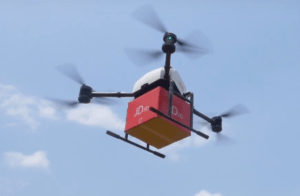With “social distancing” the phrase of the week around the world, the time may have come for communities and governments to embrace drone delivery – not just for speed and convenience, but to protect themselves and vulnerable members.
The World Economic Forum has published a blog post highlighting the contributions that drones have made in the fight against COVID-19. “3 Ways China is Using Drones to Fight Coronavirus” brings out the contributions made by drone delivery in an environment where limiting human-to-human contact is of paramount importance.
In China, drone delivery company JD worked with government stakeholders to dramatically increase service areas to bring supplies to quarantined and isolated areas. “With the support of the local government, e-commerce company JD deployed its drone team. That team quickly conducted ground surveys, designed flight corridors, requested airspace access permission and conducted final flight tests. In just a few days, several drone delivery corridors were put in place replacing hours-long drives with a 2 km flight that could be completed in just 10 minutes,” says the World Economic Forum’s article.
A press release from JD explains: “JD opened a drone route to Baiyang Lake in Hebei province during the coronavirus period, completing the first delivery on Feb. 7th. Previously, couriers would deliver packages to the village by boat, but this route was temporarily suspended due to the virus.” Drones were a critical tool – without drones, couriers would have had to detour over 100 km to deliver via land-based routes.
JD explains that the drones drop parcels at a fixed point, allowing customers to pick them up without human-to-human contact – which minimizes the risk for both the courier and the customer.
The World Economic Forum article goes on to comment that government agencies must work with service providers to set up drone programs with speed and efficiency in crises. “Coordination between the public and private sector is essential,” says the article. “Drones are subject to strict regulation outside of consumer use and civil aviation authorities need to respond quickly to requests for health applications while preserving the safety of the airspace and those on the ground.”

Miriam McNabb is the Editor-in-Chief of DRONELIFE and CEO of JobForDrones, a professional drone services marketplace, and a fascinated observer of the emerging drone industry and the regulatory environment for drones. Miriam has penned over 3,000 articles focused on the commercial drone space and is an international speaker and recognized figure in the industry. Miriam has a degree from the University of Chicago and over 20 years of experience in high tech sales and marketing for new technologies.
For drone industry consulting or writing, Email Miriam.
TWITTER:@spaldingbarker
Subscribe to DroneLife here.








[…] actuality, this is the fantastic option for DroneUp, Walmart, and Quest to demonstrate the value of residential drone shipping and delivery. Well over and above very simple benefit, contactless delivery systems can participate in a […]